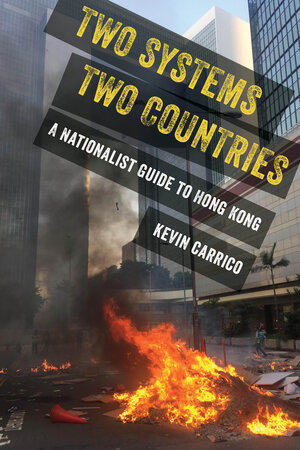By Kevin Carrico, author of Two Systems, Two Countries: A Nationalist Guide to Hong Kong
When I started writing Two Systems Two Countries: A Nationalist Guide to Hong Kong in 2019, I envisioned eventually holding a book launch in Hong Kong. The fact that such an event seems utterly preposterous today is one testament (among so many) to the speed and rapidity of the city’s downfall.
Two Systems, Two Countries traces and explains dramatic changes in political thought and identity in Hong Kong since 2011. Beginning from an analysis of rising challenges in the post-1997 Hong Kong-China relationship, I examine a series of new political visions that emerged to forever transform political discourse in the city: city-state theory, self-determination, independence, and returnism (i.e. returning the city to the United Kingdom).
The book is the product of years of research and conversations in Hong Kong that have shaped my understanding of these visions and endlessly enriched my analyses. It would have been rewarding to share my insights with people there, from whom I have learned so much, yet such an event is simply impossible in the current political environment. It is no longer a question of finding a site to host an admittedly controversial discussion, but rather whether any participant could evade imprisonment. With the implementation of the National Security Law in 2020, the type of open, honest, and even contentious discussion that long made Hong Kong great —and which was supposedly protected by the city’s Basic Law— suddenly became illegal, punished with lengthy prison sentences.
How exactly Hong Kong transformed in just a few years from an admittedly imperfect but still respectable rule-of-law-based open society to a city where people face life imprisonment for speech crimes will be the defining question in Hong Kong research in the coming decades.
It is also, however, a question that is intertwined with the debate on Hong Kong independence that I document and analyze in this book.
One popular narrative places the blame for Hong Kong’s political retrogression on independence advocates and other perceived “troublemakers.” Dismissing the idea of a Hong Kong nation as a pipe dream, this perspective sees the debate that has emerged about Hong Kong-China relations over the past decade as little more than an unnecessary provocation crossing Beijing’s “red lines” on sovereignty. Some have even argued that the entire discussion provided the central government with the perfect pretext to crack down on Hong Kong’s already endangered freedoms.
The voices reflected in Two Systems, Two Countries turn this readymade narrative on its head. First, they remind us that free speech that abides by the authorities’ taboos on matters of sovereignty is not in fact free: it is only when one steps forward and transgresses so-called “red lines” that one is actually exercising one’s freedom. Second, they remind us that any pretext for Beijing’s crackdown is only ever that — a pretext for a crackdown that was already destined to happen.
Finally, they remind us that while the idea of a Hong Kong nation may seem untenable, One Country Two System’s promise of an autonomous city unchanged for fifty years under the sovereignty of a control obsessed central government was never any less so. Nor is the current shift to One Country One System, burying people’s dissatisfaction under the NSL’s endless mountain of repression, any more realistic in the long term.
The seeming impossibility of the new visions documented in this book is then less a condemnation of these ideas themselves than a reflection of the fundamental and inescapable impossibility of Hong Kong’s post-1997 existence.
The thinkers whose ideas are articulated on the pages of Two Systems, Two Countries saw this impossibility years before anyone else. They were the first to predict Hong Kong’s current authoritarian turn. After all, this is the decidedly non-autonomous fate of China’s autonomous regions. And they were the first to devise formulas to attempt to resist this fate.
As these advocates face a stark choice between fleeing into exile, falling silent, or facing lengthy prison sentences under the National Security Law, they will find no comfort in the fact that everything about which they warned us has come true.
Yet in this truth, their ideas live on. At a moment when the failure of Hong Kong’s current system is becoming ever more apparent, we can see in these new political visions the innovation and dynamism that has long characterized Hong Kong politics. It may now lay largely dormant, but remains ready to be reawakened some day in the future.
